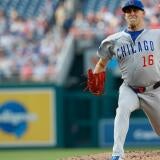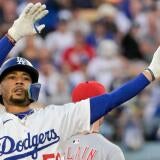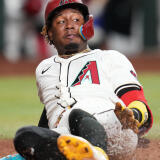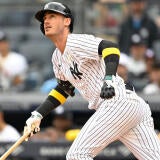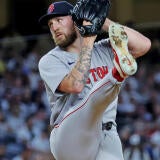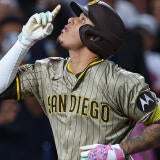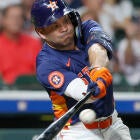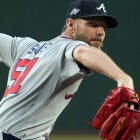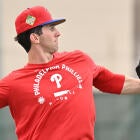Draft Day Dilemmas: Is Troy Tulowitzki ruined?
Troy Tulowitzki has been the ultimate risk/reward pick in Fantasy Baseball the last few years, but Scott White says the latter may no longer justify the former.

It became a running joke, with me as the punch line.
"First round again? Come on, CBS! I want players who'll actually, you know, play."
Well, smarty pants, the rest of the Fantasy-prognosticating world was with you, because especially last year, we were almost completely alone in projecting Troy Tulowitzki for the first round, mostly at my insistence. Yes, he was known to get hurt a lot, but with few recurrences, so unless you felt that his musculoskeletal system was compromised in some way, you could attribute it, at least in part, to luck.
But even working under the assumption that he was damaged goods, he was so far and away the best player at so far and away the weakest position that, when he was on the field, he was arguably the most valuable player in Fantasy, ahead of even Mike Trout. And so I was convinced that in a standard mixed league with an ample waiver wire, as long as he played, say, two-thirds of the season, he'd be worth it.
It was the ultimate greed play -- a chance to prove how well you adapt midseason. If you could hold your own when Tulowitzki wasn't healthy (which would be infinitely more possible if you could ride the hot hand off the waiver wire, hence the "standard mixed league" stipulation), you'd be the team to beat when he was. It's the same reason some people like Carlos Correa in the middle of Round 1 this year even though he has all of 387 at-bats to his name. That player is worth the added risk.
So is Tulowitzki that player anymore?
I'd like to say yes because I liked saying yes. On those occasions when I was the one selecting Tulowitzki in the first round, I was generally pleased with the way my season went. But instead of bullheaded confidence, the thought of taking him that early this year fills me with something unfamiliarly icky.
Dread.
It's not just the one factor -- that same one that has haunted him the last four years. It's the accumulation. Yes, he got hurt again (big surprise), but of greater concern than what his cracked shoulder blade says about his bone density (i.e., probably nothing), is that for the first time since his 2009 breakthrough, I don't know what to expect from him when he's healthy.
Tulowitzki hit .239 with a .697 OPS after getting traded to the Blue Jays last season, which would seem coincidental if he wasn't leaving Colorado for the first time. Of course, his home-away splits weren't as exaggerated as most Rockies' hitters -- he has about an .800 OPS on the road for his career, which is still exceptional for a shortstop -- and if you buy into the idea that leaving Coors Field improves a hitter's road numbers, a move to the hitter-friendly Rodgers Center, incomparable though it may be, shouldn't be the death knell.
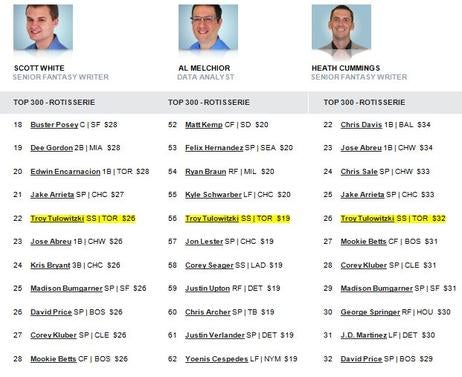
But couldn't it be?
I'd be inclined to dismiss those 163 at-bats as just a suspicious-looking slump except Tulowitzki wasn't performing up to his usual standards with the Rockies either. A June surge salvaged his numbers to some degree, but over his first 43 games last season, he hit .266 with two home runs, a .688 OPS and -- get this -- 36 strikeouts to only five walks. In the end, his strikeout rate was his highest since his rookie season and his walk rate his lowest ever -- both by a considerable margin, by the way -- which are normally indications of a player's bat slowing down.
Tulowitzki is 31 now. That's old for a shortstop. And while some of the best of the last 15 years (Derek Jeter, Miguel Tejada and Jimmy Rollins) continued to perform at a high level into their 30s, the majority (Nomar Garciaparra, Edgar Renteria, Rafael Furcal, Jose Reyes, to name a few) saw a steep drop in production. Even Hanley Ramirez, who moved off the position, appears to be on his last legs at 32.
So is Tulowitzki one of the exceptions? What little evidence we have suggests no.
Look, it's staggeringly little evidence. If that stint with the Blue Jays doesn't happen, we're not having this discussion today. Given that drafting him was already a gamble, though, I'm reluctant to do so in the second round, much less the first.



